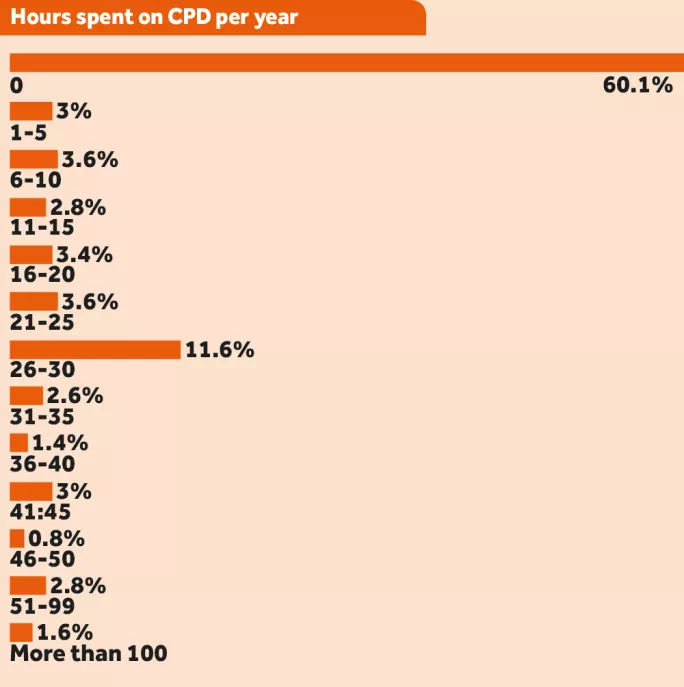Many teachers in further education colleges arrive in the sector as experts in their field and hold high-level teaching qualifications - but it is undeniable that regular training is essential to maintain high performance.
Indeed, continuous professional development was a formal requirement until only a few years ago.
However, the Further Education Workforce Data for England report, published by the Education and Training Foundation (ETF) and exclusively revealed in today’s Tes, shows almost two-thirds of FE teachers do not spend any time at all on CPD.
The report, which is based on Staff Individualised Record (SIR) data from 102 colleges and a number of providers, finds that, in 2015-16, the average FE teacher spent 15 hours a year on CPD. But that average masks the fact that 60 per cent report spending no time at all on that kind of formal training.
This is the first time the SIR has collected data on CPD, so no comparative data exists. But sector experts say the low number of teachers engaging in CPD is partly due to the large proportion of FE staff who work part-time. The University and College Union urges college leaders to ensure all staff have access to professional development opportunities.
UCU general secretary Sally Hunt says it is vital that teachers are supported to refresh their skills and share knowledge during their careers, so they can remain up to date with industrial and pedagogical developments.
“CPD for staff is an essential part of post-school education that benefits both the recipient and their students. Busy staff already have massive workloads, so colleges need to make time and resources available so all staff have the opportunity to access CPD.
“Colleges should be looking for ways to share best practice around CPD and work with nearby colleges to deliver it.”
David Powell, director of the Education and Training Consortium of higher education and FE teacher training providers, led by the University of Huddersfield, says: “Initial teacher training is just that. It starts people on a journey. It needs to be followed up by a comprehensive, sustained development programme. The figures do not seem to suggest that.”
He adds: “What I know from some CPD we have been running is that it is increasingly difficult for people to get release for external training. But what about internal development?” There could also be issues with CPD not being recorded as such, and therefore not featuring in the statistics, says Mr Powell.
The main reason for the small proportion of staff engaged in CPD is likely to be the high number of sessional and part-time staff in further education, according to Kevin Gilmartin, post-16 and colleges specialist at the Association of School and College Leaders. “It is rarely possible to require them to engage in CPD in the same way as full-time staff, as colleges will need to pay them to do the training,” he says.
“This will only change if there is more money in the sector to allow for that change. Most colleges do now require their full-time staff to engage in CPD and training is often linked to individual performance management targets. It is always advantageous if staff do engage in professional development and all college leaders will want that from their staff. If staff don’t do it, it will be down to financial constraints, not to unwillingness.”
And Karen Sanders, director for employment policy and services at the Association of Colleges, said: “Colleges fully recognise the valuable contributions of their entire workforce as skilled, qualified and vocationally current professionals. Average direct college spending on workforce development adds up to about 0.5 per cent of income.”
Sanders explains that although the requirement to undertake 30 hours of CPD annually was repealed, “many colleges retain the requirement in their contracts.”
@JBelgutay


